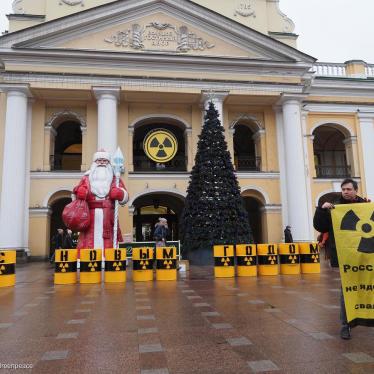(Moscow) – Repression escalated in Russia during 2019 as the government answered rising civic and political activism with bans, repressive laws, and showcase prosecutions, Human Rights Watch said today in its World Report 2020.
The authorities carried out large-scale smear campaigns against independent nongovernmental groups, using fines against groups and their leaders to impede and even end their work. The government took this campaign to a new level with criminal investigations targeting activists of the pro-democracy Open Russia civic movement and the opposition politician Alexei Navalny’s Foundation Against Corruption. The authorities forcibly shut down two human rights organization, including one specializing in minority rights.
“The human rights situation in Russia has gotten progressively worse over the past seven years,” said Hugh Williamson, Europe and Central Asia director at Human Rights Watch. “In 2019, the Kremlin upped its game on punitive measures to suppress critics and independent activism across the country.”
In the 652-page World Report 2020, its 30th edition, Human Rights Watch reviews human rights practices in nearly 100 countries. In his introductory essay, Executive Director Kenneth Roth says that the Chinese government, which depends on repression to stay in power, is carrying out the most intense attack on the global human rights system in decades. He finds that Beijing’s actions both encourage and gain support from autocratic populists around the globe, while Chinese authorities use their economic clout to deter criticism from other governments. It is urgent to resist this assault, which threatens decades of progress on human rights and our future.
Public discontent with domestic policies triggered the uptick in civic activism. Record numbers of people protested the groundless exclusion of opposition candidates from a local Moscow election, with authorities responding with an overwhelming show of force, detentions, and rushed criminal prosecutions. Officials’ disregard for public concerns about the environmental and health impacts of waste management and industrial projects sparked widespread protests, and the authorities routinely harassed and prosecuted environmental activists.
The situation for human rights defenders deteriorated. The authorities used bogus charges to fine or jail them, while failing to deter or prosecute physical attacks and harassment against them.
The Russian authorities used vague and repressive legislation to stifle critical and independent voices online and offline. Parliament adopted new restrictions to online speech and a law to allow isolation of the Russian segment of the internet. They also expanded the network of surveillance cameras modeled after the disreputable system used by China in Xinjiang.
A new law expanded the government’s use of the label “foreign agents” to private persons, to cover bloggers and independent journalists. Another new law provides for ruinous fines against internet companies for repeated refusal to hand over encryption keys to security services. The authorities used “justification of terrorism” charges to silence two journalists criticizing anti-terrorism policies and repression.
The human rights situation in the North Caucasus remained grim, with drug-related charges used to retaliate against a journalist and a prominent human rights defender. Large-scale protests against the border demarcation between Ingushetia and Chechnya resulted in mass detentions and prosecutions. There was a new wave of persecutions of lesbian, gay, bisexual, and transgender (LGBT) people in Chechnya, with complete impunity despite an international outcry.
Torture and other ill-treatment in custody remained widespread across Russia, despite government’s promises in 2018 to end it.
Domestic violence remained pervasive across Russia, with inadequate services for survivors. Russia’s Justice Ministry told the Council of Europe that the issue was “exaggerated” after the European Court of Human Rights started considering new cases concerning Russia.
Police in Moscow and other regions carried out widespread racial profiling. An Udmurt academic’s self-immolation protested the suppression of minority languages and cultural heritage.
Russian law enforcement persecuted minority religious groups. Hundreds of Jehovah’s Witnesses were detained and tried on extremism-related charges for peacefully gathering in their congregations.
The Russian government also ignored human rights abuses by Russia-backed armed rebel groups in eastern Ukraine. Authorities also harassed and criminally prosecuted Crimean Tatars in occupied Crimea on trumped-up charges. Russian forces continued to play a key military role alongside the Syrian government in offensives on anti-government-held areas, participating in indiscriminate attacks hitting schools, hospitals, and civilian infrastructure.









